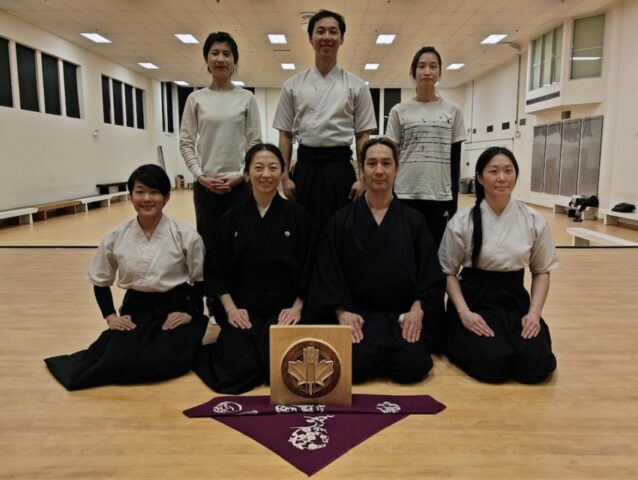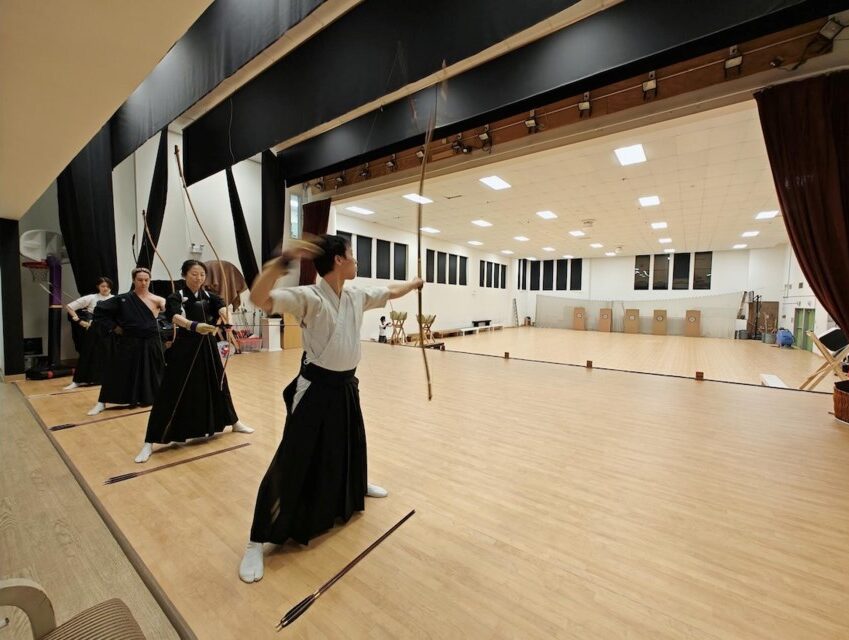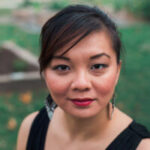Ten members of a local Japanese archery club shot 108 arrows to welcome the new year.
The number 108 represents the 108 earthly temptations in Buddhism. In Japan, people line up and ring the bells at Buddhist temples 108 times (joya no kane) to dispel the worldly desires of every Japanese citizen.
Kyudo clubs in North America adapted the concept to their practice and the Kyudo Association of Canada Vancouver has followed this modern tradition for the past 11 years, shooting 108 arrows usually on the first Saturday of the year.
Kyudo means “the way of the bow” in Japanese.
Fourth-degree black belt Linda Kong said people usually start to feel the strain on their bodies around the 70th arrow or so. “It’s all over but you’ll feel more in the back, arms, and shoulder.”
Soreness won’t come until the next day, she added.
After shooting her 76th arrow, Grace Ho said she still felt invigorated, pacing herself with breaks, food, and water.
The kyudo practitioner of seven years found satisfaction in shooting all 108 arrows for the first time last year and sought the feeling again. “I’d rather be here than elsewhere,” she says of the 2024 gathering.
Michael “Mike” James Mitsuo Nakatsu, the chief instructor who is a fifth-degree black belt, explained that one of the 108 vices is sloth or laziness. “You can do everything from your chair today. To shoot 108 arrows is to push past [that complacency]. You have to physically challenge yourself because no one else will do it for you. It’s not easy.”
Seven people completed their goal of 108 arrows.
Vancouver club founder discovered kyudo while living abroad in Japan
Nakatsu founded both the Kyudo Association of Canada and its Vancouver branch after living in Japan from 2000 to 2003, where he practiced the martial art.
When the fourth-generation Japanese Canadian returned to Canada, there were no kyudo clubs.
“I had two choices: either start a club or quit kyudo forever.”
When asked what drew him to kyudo, Nakatsu admitted he didn’t enjoy it initially because the martial art has a steep learning curve and takes a lot of time and work just to get to the point where you can shoot safely.
In Japan, at a community centre with a traditional outdoor kyudo dojo on the roof, he paid the 180-yen fee and shot continuously. “It was the time alone, just shooting arrows, that I felt peace for the first time.”
Sometimes, he shot arrows by himself. Sometimes, he was with his senseis.
Growing up in an East Van neighbourhood, Nakatsu said fighting and violence were an everyday thing. “My life has always been fueleld by rage, and rage is what kept me driven.
“That day in Japan was my first day of feeling peace and kyudo is what keeps me peaceful.”
With support from his Sensei in Fukuoka and the Vancouver Japanese Language School & Japanese Hall, Nakatsu set up a dojo with makiwara (close range) targets, gomuyumi (practice rubber bows) and bows and arrows for members to practice at the full 28-metre distance.
With about 20 members, the club continues to grow.

Battling misconceptions about the Japanese martial art
One of its newer members, Benjamin Li discovered the martial art after YouTube recommended a kyudo video to him. He searched for local clubs after watching that video.
Li only had one month of experience with the bow after completing the mandatory 10-week introduction course.
In the practice area with the close range targets, Li learned a little more about what’s wrong with his technique since he was unable to reach the goal. While not disclosing the exact number, he said it was under 40 arrows.
“As a beginner, it feels scary.”
The twang of the bow, the sound of the arrow hitting the target. He was told he flinched a lot.
But Li is growing confident and said he’s flinching less.
“If I’m going to try something, I don’t want to do it once and give up easily.”
He found kyudo at the right time. “I just graduated high school and told myself I need to try new things.”
When asked about misconceptions about kyudo, Nakatsu replied, “It’s not practical. The bow is seven feet long and delicate. This bow is not good for hunting or self-defense.”
He has also encountered people who think kyudo is battlefield archery, the type of shooting you would see in a samurai movie.
While there are groups that practice that in Japan and many of those practitioners have to do kyudo before they do that style of archery, Nakatsu said, but that is not what kyudo is.
In the early 17th Century, the shogun Tokugawa Ieyasu unified the warring samurai factions and there was a long period of peace, describes Kyudo: the Essence and Practice of Japanese Archery. With the absence of war and the introduction of firearms, samurai archers didn’t want to abandon kyujutsu (“the technique of fighting with a bow”) so they set up a regular competition at a temple in Kyoto.
In the latter half of the 17th Century, ceremonial shooting became popular after the general populace took up archery. Morikawa Kozan first coined the word “kyudo” but it would take nearly two hundred years before the term became accepted and commonplace. The emphasis on archery training shifted to mental and spiritual development.
Nakatsu said very few people do it outside of Japan. “About 200 in America and under 100 in Canada.”
_____________________________________________
Deanna Cheng is a Vancouver-based New Canadian Media correspondent currently on a work experience placement with Glacier Media. This article was originally published on Vancouver Is Awesome.
Deanna Cheng is a freelance journalist who has been published in various publications such as Vancouver Courier and Asian Pacific Post. She often covers culture, intersectionality and Vancouver.


